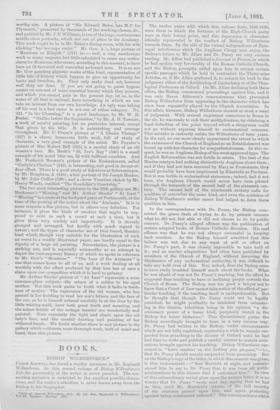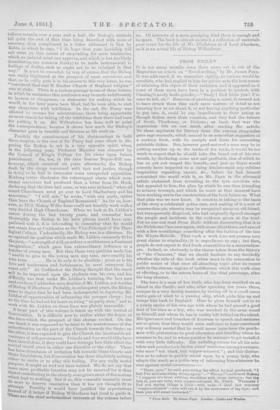BOOKS.
BISHOP WILBERFORCE'.*
CANON ASIIWELL has found a worthy successor in Mr. Reginald Wilberforce. In this second volume of BishoP Wilberforce'e Life the personality of the writer is never paraded. The con- necting narrative is restricted to the smallest possible dimen- sions, and the reader's attention is never drawn away from the Bishop to his biographer.
• Life of 8arnial IV,Lberforar, AD. By Ida Son, Reginald G. Wilburforco. Vol. IL Loudon ilurmy. 1891. The twelve years with which this volume deals, 1848-1860, were those in which the fortunes of the High-Church party were at their lowest point, and this depression is character- istically represented in the conduct of Bishop Wilberforce towards them. By the side of the virtual independence of Epis- copal interference which the Anglican Clergy now enjoy, the Bishop's letters to Mr. Allies and Dr. Pusey are very curious reading. Mr, Allies had published a journal iu France, iu which he had spoken very favourably of the Roman Catholic Church, and the Bishop promptly called upon him to retract certain specific passages which he held to contradict the Thirty-nine Articles, or, if Mr. Allies preferred it, to submit his book to the judgment either of the Archbishop of Canterbury or of the Theo- logical Professors at Oxford. On Mr. Allies declining both these offers, the Bishop commenced proceedings against him, and it was only Baron Alderson's remonstrances that prevented Bishop Wilberforce from appearing in the character which has since been repeatedly played by the Church Association. In this affair, however, Bishop Wilberforce showed at most a want of judgment. With several important secessions to Rome in the air, he was ready to risk their multiplication, by obtaining a legal definition of the point beyond which a clergyman could not go without exposing himself to ecclesiastical censures. This mistake is curiously unlike the Wilberforce of later years. In the end, uo one more clearly appreciated the extent to which the existence of the Church of England as an Establishment was bound up with her character for comprehensiveness. in this re- spect, he was an Anglican Bishop of the most approved type. The English Reformation was not fertile in saints. The best of the Marian martyrs had nothing distinctively Anglican about them ; and if they had not been executed by Mary as Protestants, they would probably have been imprisoned by Elizabeth as Puritans. But it was fertile in ecclesiastical statesmen ; indeed, had it not been, the Anglican Church would never have been piloted through the tempests of the second half of the sixteenth cen- tury. The second half of the nineteenth century calls for qualities of somewhat, the same kind, and even the mistakes of Bishop Wilberforce's earlier career had helped to form these qualities in him.
In the correspondence with Dr. Pusey, the Bishop com- mitted the grave fault of trying to do by private censure what he did not feel able or did not choose to do by public censure. Dr. Pusey's alleged offence was the publication of certain adapted books of Roman Catholic devotion. His real' offence was that he was not always successful in keeping back seceders. As the Bishop himself admitted that this failure was not due to any want of will or effort on Dr. Pusey's part, it was clearly impossible to take hold of it ; and as similar adaptations had often been published by members of the Church of Euglaud, without incurring the displeasure of any ecclesiastical authority, it was difficult to take any hold even of this. Nor, indeed, does the Bishop seem to have really troubled himself much about the books. What be was afraid of was not Dr. Pusey's teaching, but the effect he supposed that teaching to have in inclining people towards the Church of Rome. The Bishop was too good a lawyer not to, know that a Court of Law cannot take notice of the effect of par- ticular teaching, if the teaching itself is unobjectionable. But he thought that though Dr. Pusey could not be legally punished, he might profitably be inhibited from minister- ing in the diocese, inhibition being in his opinion " a dis- cretionary power of a lessor kind, purposely vested in the Bishop for lesser instances," This discretionary power the Bishop accordingly brought to bear, in a very curious way. Dr. Pusey had written to the Bishop, under circumstances which are not fully explained, expressing a wish to remain sus- pended from preaching in the diocese of Oxford until he had had time to write and publish a careful answer to certain accu- sations brought against his teaching. Bishop Wilberforce con- sented to " leave matters on the footing you propose,"—i.e.,. that Dr. Pusey should remain suspended from preaching. But on the Bishop's copy of the letter, in which this consent was given, is this endorsement :—" Saw Marriott at night, and commis- sioned him to say to Dr. Pusey that it was from all public ministrations in this diocese that I restrained him." Li view of this extraordinary verbal gloss upon the written letter, it is no wonder that Dr. Pusey " wrote next day, saying that he had no idea, until Mr. Marriott's return, of the full severity of the sentence passed upon him, and again protesting against being condemned unheard." The correspondence which follows extends over a year and a half, the Bishop's attitude till quite the end of that time being described with . more of accuracy than compliment in a letter addressed to him by Keble, in which he says, " I do hope that your Lordship will not enter on this course of suspending for mere tendencies, which no judicial mind can approve, and which is but too likely .(considering our common frailty) to be made instrumental to feelings of dislike, such as ought not to be indulged in that .way." it must be conceded, by way of excuse, that the Bishop was really frightened at the prospect of more secessions, and that, as be oddly puts it in his answer to this very letter, he was ." convinced that real R. Hooker Church of England religion" Was at stake. There is a curious passage in one of these letters, in which he maintains that confession may be made indifferently to laymen or clergymen;-- a statement for making which he would, in his later years, have liked, had he been able, to visit any Clergyman with inhibition. In the end, Dr. Pusey was allowed to resume his ministrations, there being apparently no more reason for taking off the inhibition than there had been for putting it on. Mr. Wilberforce has done well to print the correspondence, because it shows how much the Bishop's character grew in breadth and fairness as life went on.
Possibly the consciousness of his shortcomings in both these respects in the case of Dr. Pusey had some share in dis- posing the Bishop to act in a very opposite spirit when, in the following year, Professor Maurice was censured by the Council of King's College for his views upon future punishment. So, too, in the once famous Boyne-Hill con- troversy, which occurred six years afterwards, the Bishop dealt, by the clergy concerned with tact and justice, though in doing so ho had to encounter some unexpected opposition. Nothing better illustrates the extravagant alarm which occa- sional secessions had produced than a letter from Dr. Hook, declaring that the time had come, or was near at hand," when all sound Churchmen must go over to Lord Shaftesbury and his associates." "I will side," he wrote, "with any party, rather than have the Church of England Romanised." As far on, how- -ever, as 1.8r)9, Bishop Wilbe..force could not heartily work with a very decided High Churchman. When we look at Dr. Liddon's career during the last twenty years, and remember how thoroughly the Bishop in his later phases would have sym- Pathised with it, it is interesting to remember that he would not retain him at Cuddesdou as the Vice-Principal of the Theo- logical College. Undoubtedly, the Bishop was in a dilemma. He 'recognised the qualities which made Mr. Liddon eminently fit fur the post,—" a strength of will, an ardour, a restlessness, a d ominant imagination," which gave him extraordinary influence as a teacher of young men. But then these very qualities made him 4' unable to give to the young men any tone, save exactly his own tone He is fit only to be absolute ; groat as is his love and tenderness. and forbearance, he must reimpress his
• exact self." At Cuddesdou the Bishop thought that the exact self to be impressed upon the students was his own, and his difficulty was that under Mr. Liddon's training, the best men sent out from Cuddesdon were doubles of Mr. Liddon, not doubles of Bishop Wilberforce. Probably, in subsequent years, the Bishop 'Dame to regret that he had been instrumental in depriving Mr. Liddell of opportunities of influencing the younger clergy ; but at the time he had set his heart on being " no party man," and to 'work with Mr. Liddon on these lines was plainly impossible. A large part of this volume is taken up with the revival of Convocation. It is difficult now to realise either the hopes or the fears which the prospect of this change excited. On the one hand, it was supposed to be fatal to the maintenance of due • subordination on the part of the Church towards the State; on the other, it was expected to give the Church the inestimable ad- vantages of self.government. Friends and foes would alike have been incredulous, if they could have foreseen how little effect the -revival would exert in either one direction or the other. There Sias been abundance of irritation felt towards State Courts and State Legislation, but Convocation has done absolutely nothing -either to
purpose, excite or to allay this feeling. For any really useful it might as well not have existed. We do not say that some more profitable function may not be reserved for it than l
atof contributing to the already over-grown stock of discussions which lead to nothing. But if so, this venerable assembly must 'do more
attempt, to deserve veneration than it has yet thought fit to Possibly it would have justified the expectations ',formed of it better if Bishop Wilberforce had lived to guide it. These aro the chief ecclesiastical interests of the volume before us. Of interests of a more gossiping kind there is enough and to spare. The book is almost as much a collection of materials pear servir for the life of Mr. Gladstone or of Lord Aberdeen, as it is an actual life of Bishop Wilberforce.



































 Previous page
Previous page